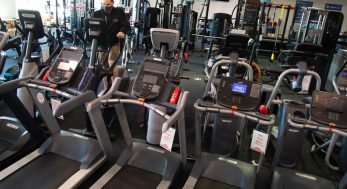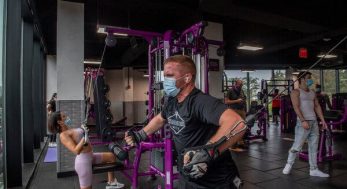Working one-on-one with a personal trainer can be a rewarding experience – whether you’re new to fitness, looking to improve your technique, or need some guidance in hitting your goals.
Trainers can provide a customised fitness program tailored around your lifestyle, goals and your body’s needs. No matter where you are in your fitness journey, we could all use advice and reminders on how to prevent injury, stay motivated or maintain proper form during our exercises. Most often, trainers are certified experts (they should be! But we’ll get to that later…) that also provide insight on nutrition, how to maintain a fitness routine that works with your lifestyle, proper technique and how to set achievable goals.
Not to mention, they hold you accountable – try explaining to your trainer why you can’t meet them for your Sunday morning session. They’ll push you to work hard, find ways to motivate you, be your biggest cheerleader when you hit your goals and can make exercising feel more fun. If anything, they can lend an ear when you need to vent about a horrible date or nagging boss – all while doing burpees and squats of course.
“The right personal trainer will listen to your goals and needs, formulate a plan and design a programme to help you reach the results you want – while also taking into account what your body needs,” says Tara Gadre, co-founder of Strength House Gym in London.
We’ve rounded up five important things to consider when looking for the right personal trainer for you.
Check their credentials
First and foremost, you should clarify your trainer’s level of qualification. Although there are various ways to become qualified, the basic standard you’re looking for is a Level 3 Personal Training certificate.
“Don’t be afraid to ask to see certificates and also make sure that they have valid insurance,” explains personal trainer Fiona Bothwell. “Insurance companies will insist that a personal trainer is qualified before agreeing cover”.
In addition to a Level 3 certificate, trainers are required to keep their knowledge up to date and relevant through annual Continuing Professional Development (CPD). Courses can range from kettlebells, to suspension training or even combat. The CPD that a trainer chooses will most likely reflect their special interests, such as pre- and post-natal qualifications for working with women who are pregnant or new mums.
Confirm a location
If you’re not a fan of training in the gym, then you might want to consider meeting in the park, scheduling sessions via Zoom calls, or inquiring whether or not the trainer is able to come to your home (while keeping in mind the current social distancing guidelines). However, be aware that meeting in areas outside of the gym will impact the amount of equipment available for use. When exercising in the gym, the trainer can help spot you when lifting heavy weights or instruct you on how to use the machinery.
Confirming a meeting location “ensures there’s no anxiety on their or your end before the session,” says trainer Kacie Shoulders. She also adds that it “shows a level of organisation and communication on the side of the personal trainer.”
Find out their vibe
If you want to enjoy the time you spend working out with your trainer, it’s important to ensure you’re happy and comfortable with their approach. Some trainers have a tough-love method where they push you hard through militant verbal cues and intense energy, while others play on friendly competition or take a more slow and gentle mode. None of these techniques are incorrect, it just depends on what kind of motivation you need.
The best client-trainer relationships are built on honesty and trust. You’ll potentially be sharing your progress and fitness wishes with them, as well as seeing them on good and bad days. Making sure that you get on well means that you’ll be more likely to turn up for your sessions.
In addition to putting your feelers out during your initial consultation, you can learn more about the trainer through their personal website or social media.
Gina Obeng (aka Just Geen), personal trainer and founder of Train To Slay, says that “Instagram is probably one of the easiest ways to learn about your PT’s vibe. I use my platform to showcase my approach to training and my personality, so I feel like a new client will be able to gauge what they’re in for by going through my posts and stories.”
She added, “I think it’s important because vibe is everything. You want to make sure you’re aligned with the person you’re going to work with. Exercise can be challenging both physically and mentally, so picking the right person should help with the experience.”
Do your research
‘[You’ll want to] make sure that your personal trainer’s approach is client defined,” says Tara. “A PT should be professional, empathetic, organised, and make client-defined decisions. The programme and service delivered should fit the client’s needs and not the other way around.”
“Too often in this industry, we see people being made to fit a certain exercise or try a new trend without having the understanding of what their body needs. Ask if the trainer is on the journey to becoming a Resistance Training Specialist. These trainers are on the path to truly becoming a specialist in the sciences and skill of customising the application of resistance for an individual”.
Ask around
Fiona further suggests considering who the trainer has worked with before and to look for testimonies from previous clients – which you may be able to find on their website or social media channels.
When it comes to finding a personal trainer you would love to work with, the best method is through word of mouth – try asking friends, family or colleagues for recommendations. If you’re already a member of a gym, there will be a pool of personal trainers based there for you to choose from.
Alternatively, search the National Register of Personal Trainers who have a listing of registered qualified trainers in your area. Or, try searching online for Facebook groups of gyms and studios that are set up in your local area who might be able to provide listings of trainers.
Tara recommends you “take time to do your own research and go view facilities. Most services will offer a complimentary consultation where you can dig deeper to ask any questions you have, find out about their client results, experience and history”.
You may also like
Bride-to-be has some choice words for personal trainer who tried to body-shame her
Follow @StrongWomenUK on Instagram for the latest workouts, delicious recipes and motivation from your favourite fitness experts.
Images: Getty


